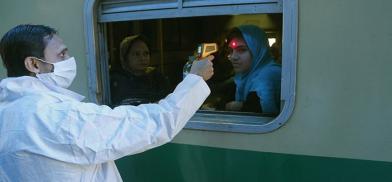Active cases of coronavirus drop to 43pc in Pakistan
Coordinated efforts against the novel coronavirus (COVID-19) are bearing fruit in Pakistan with a continuous drop in number of active cases, as the gap between the total number of patients and those fully recovered has narrowed further, Dawn has learnt

Coordinated efforts against the novel coronavirus (COVID-19) are bearing fruit in Pakistan with a continuous drop in number of active cases, as the gap between the total number of patients and those fully recovered has narrowed further, Dawn has learnt.
Of the 231,017 cases reported till the late hours of Sunday, only 101,187 (43.8pc) are active as the remaining 129,830 patients have fully recovered since the outbreak of virus in Pakistan.
Over the past 24 hours, the country reported 3,763 new cases and the recovery of 4,736 patients with 65 deaths, taking the national tally of cases to 231,017, recoveries to 129,830 and death toll to 4,745.
Spokesperson for the Ministry of National Health Services (NHS) Sajid Shah told Dawn that the federal and provincial governments did make efforts, but the smart lockdown policy, proposed by Prime Minister Imran Khan, played a major role in narrowing the gap. It was due to the smart lockdowns in different parts of the country that the number of new cases decreased whereas the pace of recoveries remained the same.
WHO discontinues trial of hydroxychloroquine
It was encouraging that the NCOC recommendations were being followed across the country due to which all the projected figures of positive cases proved wrong, Mr Shah said.
According to the National Command and Operation Centre (NCOC) on COVID-19, as many as 57pc of the patients have recovered and only 43pc cases are active.
Earlier, it was feared that there would be 300,000 cases across the country by the end of June but the number of cases only crossed the 200,000 mark on the last day of June 2020.
The NCOC data showed that only 467 of the total 1,525 ventilators dedicated for the COVID-19 patients across the country were occupied on Sunday.
Meanwhile, the World Health Organisation (WHO) has discontinued trial of hydroxychloroquine [which is used for treatment of malaria] and lopinavir/ritonavir as they produce little or no reduction in the mortality rate of hospitalised patients of coronavirus.
The WHO accepted the recommendation from the Solidarity Trial’s International Steering Committee to discontinue the trial of hydroxychloroquine and lopinavir/ritonavir. The Solidarity Trial was established by the global health organisation to find an effective COVID-19 treatment for hospitalised patients.
According to a statement, the International Steering Committee formulated the recommendation in light of the evidence for hydroxychloroquine vs standard-of-care and for lopinavir/ritonavir vs standard-of-care from the Solidarity Trial’s interim results, and from a review of the evidence from all trials presented at the WHO Summit on COVID-19 research and innovation on July 1 and 2.
“These interim trial results show that hydroxychloroquine and lopinavir/ritonavir produce little or no reduction in the mortality of hospitalised COVID-19 patients when compared to standard of care. Solidarity trial investigators will interrupt the trials with immediate effect,” it stated.
For each of the drugs, the interim results did not provide solid evidence of increased mortality. This decision applied only to the conduct of the solidarity trial in hospitalised patients and did not affect the possible evaluation in other studies of hydroxychloroquine or lopinavir/ritonavir in non-hospitalised patients or as pre- or post-exposure prophylaxis for COVID-19.
In March, US President Donald Trump at a press briefing at the White House had claimed that the Food and Drug Administration (FDA) had approved the “very powerful” drug chloroquine to treat COVID-19. He had said the medicine had shown very encouraging results and would be available in the market almost immediately. He said that normally the FDA took a long time to approve drugs but due to the nature of the case it was approved quickly.
As a result of the statement, people across the world started using the medicine for prophylactic treatment.
However, the FDA later issued a statement that it had not approved the medicine for treating COVID-19 and was studying its use against the disease. Later, trials of medicine were initiated and even the WHO also took interest in it.
On March 22, the sale of chloroquine, without prescription, was banned in Pakistan to ensure its availability in the market.
https://www.dawn.com/news/1567269/active-cases-of-coronavirus-drop-to-43pc








Post a Comment